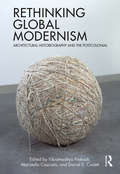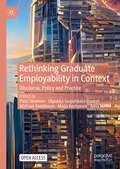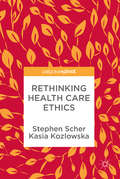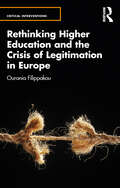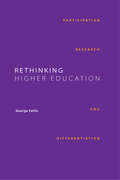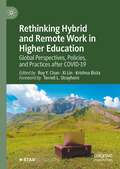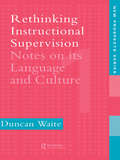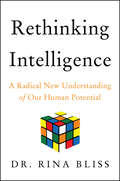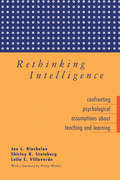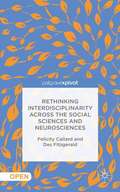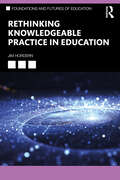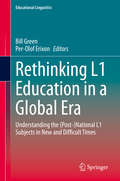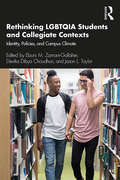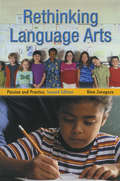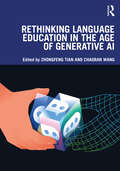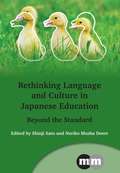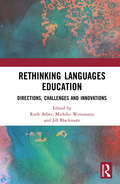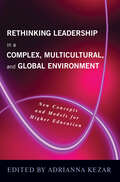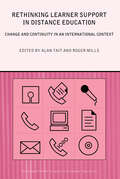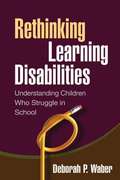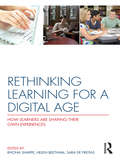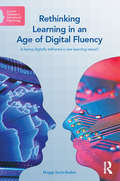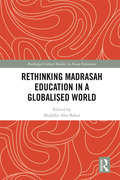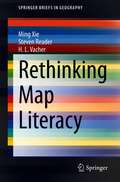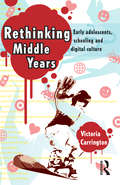- Table View
- List View
Rethinking Global Modernism: Architectural Historiography and the Postcolonial
by Vikramaditya Prakash Daniel E. Coslett Maristella CasciatoThis anthology collects developing scholarship that outlines a new decentred history of global modernism in architecture using postcolonial and other related theoretical frameworks. By both revisiting the canons of modernism and seeking to decolonize and globalize those canons, the volume explores what a genuinely "global" history of architectural modernism might begin to look like. Its chapters explore the historiography and weaknesses of modernism's normative interpretations and propose alternatives to them. The collection offers essays that interrogate transnationalism in new ways, reconsiders the agency of the subaltern and the roles played by infrastructures, materials, and global institutions in propagating a diversity of modernisms internationally. Issues such as colonial modernism, architectural pedagogy, cultural imperialism, and spirituality are engaged. With essays from both established scholars and up-and-coming researchers, this is an important reference for a new understanding of this crucial and developing topic.
Rethinking Graduate Employability in Context: Discourse, Policy and Practice
by Michael Tomlinson Päivi Siivonen Ulpukka Isopahkala-Bouret Maija Korhonen Nina HaltiaThis open access book offers critical, multidisciplinary analyses on graduate employability. The book examines employability at the macro, meso and micro levels: higher education policy, the labour market, higher education institutions, organisations, individuals and social groups, in European, North American and Australian contexts. The contributors provide social and contextual analysis of graduate employability as a theoretical concept, a discourse and policy imperative and a social and discursive practice. The volume also introduces novel methodological perspectives to study the process of graduate employability. There is an urgent need for comprehensive and unified critical perspectives on graduate employability, as such analyses have so far been scarce and often isolated. Besides filling this gap in the literature, the book will also serve as essential reading on courses that focus on graduate careers and employability as well as higher education policy and practice.
Rethinking Health Care Ethics
by Stephen Scher Kasia KozlowskaThe goal of this open access book is to develop an approach to clinical health care ethics that is more accessible to, and usable by, health professionals than the now-dominant approaches that focus, for example, on the application of ethical principles. The book elaborates the view that health professionals have the emotional and intellectual resources to discuss and address ethical issues in clinical health care without needing to rely on the expertise of bioethicists. The early chapters review the history of bioethics and explain how academics from outside health care came to dominate the field of health care ethics, both in professional schools and in clinical health care. The middle chapters elaborate a series of concepts, drawn from philosophy and the social sciences, that set the stage for developing a framework that builds upon the individual moral experience of health professionals, that explains the discontinuities between the demands of bioethics and the experience and perceptions of health professionals, and that enables the articulation of a full theory of clinical ethics with clinicians themselves as the foundation. Against that background, the first of three chapters on professional education presents a general framework for teaching clinical ethics; the second discusses how to integrate ethics into formal health care curricula; and the third addresses the opportunities for teaching available in clinical settings. The final chapter, "Empowering Clinicians", brings together the various dimensions of the argument and anticipates potential questions about the framework developed in earlier chapters.
Rethinking Higher Education and the Crisis of Legitimation in Europe (Critical Interventions #15)
by Ourania FilippakouBuilding on Ourania Filippakou’s previous work on higher education in the fields of governance, neoliberalism, university entrepreneurialism and marketization, institutional and social stratification, Rethinking Higher Education and the Crisis of Legitimation in Europe contributes to the debate on higher education from a critical policy perspective. Introducing new ideas on the relationships between the alleged pursuit of excellence in higher education and the ways in which both deploys and reflects how power is wielded in Europe and other neoliberal capitalist societies. The term "legitimation" is here coined to emphasize how new coercive strategies, political decisions, and management styles have emerged in the age of excellence in higher education. The book concludes with a more personal reflection on the neutrality of higher education and its illusory promises.
Rethinking Higher Education: Participation, Research, and Differentiation (Queen's Policy Studies Series #306)
by George FallisThe basic structure of universities and colleges in Ontario - one focused primarily on expansion and greater access and put in place in the 1960s - is outdated. The system is now large enough, the eligible age group for entering post-secondary studies is shrinking, and participation rates are as high as they are likely to go. In Rethinking Higher Education, George Fallis argues that policy-makers should shift their attention away from growth and towards improving and diversifying the range of programs available and creating new means of program delivery. He calls for increases in honours undergraduate programs and polytechnic education and envisions a group of research-intensive universities responsible for doctoral education. The existing design, Fallis contends, neglects the specific needs of graduate education and research, layering it on top of a system designed for undergraduate education. In addition, there is disconnection between Ontario's Ministry of Training, Colleges, and Universities and the research missions of the universities and colleges themselves. Fallis recommends that Ontario establish a system for documenting and assessing the quality of research published at universities. Thought-provoking and thoroughly argued, Rethinking Higher Education provides a detailed design for higher education in the twenty-first century.
Rethinking Hybrid and Remote Work in Higher Education: Global Perspectives, Policies, and Practices after COVID-19
by Krishna Bista Roy Y. Chan Xi LinThis timely volume explores the current and future state of hybrid and remote work in higher education from national, regional, and global perspectives. Today, colleges and universities worldwide must ensure that they have adequate information and communications technology (ICT) infrastructure, equipment, and systems to adapt to the “new normal” post-COVID-19. Hybrid and remote work can be a source of boosting productivity and advancing institutional change in higher education. Common within the management and leadership literature, hybrid and remote work is an understudied phenomenon in higher education administration. This book investigates the rapid rise of remote and hybrid work during and after the global pandemic and what it means for the future of higher education in the United States and abroad. By developing a comprehensive, research-based knowledge and framework this book seeks to equip and empower teacher-scholars and practitioners to operate safely, securely, and efficiently in a remote or hybrid environment.
Rethinking Instructional Supervision: Notes On Its Language And Culture (New Prospects Ser. #Vol. 1)
by Duncan WaitePublished in the year 19595, Rethinking Instructional Supervision is a valuable contribution to the field of Education.
Rethinking Intelligence: A Radical New Understanding of Our Human Potential
by Rina BlissA genetics expert and professor challenges our understanding of intelligence, explaining what it truly means to be “smart,” why conventional assessments are misleading, and what everyone can do to optimize their potential.Growing up in middle-class suburban Los Angeles in the 1980s, Rina Bliss was saw intelligence as her ticket out. Like height and stature, intelligence was said to run in families. The prevailing idea was that mental capacity was determined by our DNA and could be measured; a simple IQ test could predict a child’s future.Yet, once Dr. Bliss looked closer, first as a student, then as a scientist, and later as a mom of identical twins who share a genome, she began to challenge conventional wisdom about innate intelligence. In Rethinking Intelligence, she shares her findings, drawing on cutting-edge scientific research to offer a new model for how we understand, define, and assess intelligence, using a measurement that is far more flexible and expansive.Intelligence has little to do with standardized test results or other conventional measures of intellect, Dr. Bliss argues. Intelligence is a process, a journey defined by change that cannot be scored or taken away. Intelligence is influenced by our surroundings in ways that are often overlooked—more than Baby Mozart or flash cards or superfoods, factors like stress, connection, and play actually sculpt young minds.In Rethinking Intelligence, Dr. Bliss shares insights from the burgeoning science of epigenetics to help us harness our environments to empower our minds. If we truly want to nurture potential, we must eliminate toxic stress so that our genes can work optimally, in harmony with our environment. Dr. Bliss offers successful strategies we can use as individuals and a society, including embracing a growth mindset, prioritizing connection, becoming more mindful, and reforming systemic issues—poverty, racism, the lack of quality early childhood education—that have a negative and lasting neurobiological impact.Joining acclaimed works by Carol Dweck, Amy Cuddy, and James Clear, Rethinking Intelligence reframes human behavior and intellect, offering a new perspective for understanding ourselves and our children, and the practical tools necessary to thrive.
Rethinking Intelligence: Confronting Psychological Assumptions About Teaching and Learning
by Shirley R. Steinberg Joe L. Kincheloe Leila E. VillaverdeFirst published in 1999. Routledge is an imprint of Taylor & Francis, an informa company.
Rethinking Interdisciplinarity across the Social Sciences and Neurosciences
by Felicity Callard Des FitzgeraldRethinking Interdisciplinarity across the Social Sciences and Neurosciences.
Rethinking Knowledgeable Practice in Education (ISSN)
by Jim HordernThe concepts of knowledge and practice are frequently discussed in education – but what is meant by these ideas, and how do they relate to each other? Drawing on recent research, this book breaks new ground to provide novel approaches to conceptualising educational practice, educational judgement and professional knowledge.This text focuses on the relationship between knowledge and practice in the study of education, developing the notion of ‘knowledgeable practice’ with the aim of rethinking how we understand the knowledge-practice relation in fields such as professional and vocational education, teaching and curriculum studies. It builds on studies in the sociology of educational knowledge and on theories of expertise and practice which emerge from more philosophical traditions.By developing a nuanced notion of the relation between knowledge and practice that can serve in the further exploration of policy and practice contexts in education, this book encourages critical engagement with how education is conceptualised in the light of the ongoing and emerging challenges that educators are facing today.
Rethinking L1 Education in a Global Era: Understanding the (Post-)National L1 Subjects in New and Difficult Times (Educational Linguistics #48)
by Bill Green Per-Olof ErixonThis book brings together a range of scholars from 10 different countries to address the contemporary state of play in national standard language education – i.e. the L1 subjects. It seeks to understand the field from within a comparative-historical and transnational frame. Four thematic threads are woven through the volume: educationalisation; globalisation; pluriculturalism; and technologization. The chapters range over various aspects of L1 as a school subject: literature, language and literacy; reading and writing; media and digital technology; the dialogue between curriculum inquiry and Didaktik studies; the continuing relevance of Bildung; the significance of history and nation; and new challenges of culture and environment in the face of climate change. The book concludes with a reflection on the prospects for L1 education today and tomorrow, in a now thoroughly globalised context and, accordingly, deeply implicated in a necessary new project of nation re-building.
Rethinking LGBTQIA Students and Collegiate Contexts: Identity, Policies, and Campus Climate
by Devika Dibya Choudhuri Eboni M. Zamani-Gallaher Jason L. TaylorRethinking LGBTQIA Students and Collegiate Contexts situates and problematizes identity interaction, campus life, student experiences, and the effectiveness of services, programs, and policies affecting LGBTQIA college students at both two- and four-year institutions. This volume draws from intersectional and critical perspectives to explore the complex ways in which LGBTQIA identities are shaped, discussed, and researched in higher education spaces. Chapters provide student affairs and higher education scholars with theory and practice perspectives on sociopolitical and historical contexts, student learning and development, support services, and explore how higher education reflects society’s pervasive stereotypes and lack of awareness of LGBTQIA students’ identity development and needs.
Rethinking Language Arts: Passion and Practice (Sociocultural, Political, and Historical Studies in Education)
by Nina ZaragozaIn Rethinking Language Arts: Passion and Practice, Second Edition, author Nina Zaragoza uses the form of letters to her students to engage pre-service teachers in reevaluating teaching practices, thus bringing to life a vision of an alternative classroom environment in which the teacher is the prime mover and creative leader. Zaragoza discusses and explains the need for teachers to be decision makers, reflective thinkers, political beings, and agents of social change in order to create a positive and inclusive classroom setting. This book is both a critical text that deconstructs the way language arts are traditionally taught in our schools as well as a visionary text with clear, no-nonsense directions on how to provide much needed change in our schools.
Rethinking Language Education in the Age of Generative AI
by Zhongfeng Tian Chaoran WangRethinking Language Education in the Age of Generative AI bridges the gap between theory, research, and practice in AI and language education. Through conceptual pieces, empirical studies, and practical applications, this book provides critical insights and implications for reimagining language education in the age of generative AI.The contributors explore a wide range of issues, reflections, and innovations in AI and language education across diverse contexts, including English as a Second Language (ESL), English as a Foreign Language (EFL), foreign language learning, postsecondary pathways programs for international students, and language teacher education programs. Topics examined include critical AI literacy, GenAI-informed second language teaching and assessment, teacher and student perceptions, tool development for language learning, as well as ethical considerations, policies, and guidelines. The book incorporates interdisciplinary perspectives, such as L2/foreign language studies, education, and applied linguistics, as well as global insights from countries like the United States, Canada, South Korea, Thailand, Indonesia, and the Philippines.This book is essential for students and researchers seeking to leverage AI to enhance language teaching and learning in innovative, critical, ethical, and responsible ways.
Rethinking Language and Culture in Japanese Education
by Shinji Sato Neriko Musha DoerrHow does language or culture come to be standardized to the degree that it is considered 'homogeneous'? How does teaching language relate to such standardization processes? How can teaching be mindful of the standardization processes that potentially involve power relations? Focusing on the case of Japanese, which is often viewed as homogenous in terms of language and culture, this volume explores these questions in a wide range of contexts: the notions of translation and modernity, the ideologies of the standardization of regional dialects in Japan, current practices in college Japanese-as-a- Foreign-Language classrooms in the United States, discourses in journals of Japanese language education, and classroom practices in nursery and primary schools in Japan. This volume's investigation of standardization processes of Japanese language and culture addresses the intersections of theoretical and practical concerns of researchers and educators that are often overlooked.
Rethinking Languages Education: Directions, Challenges and Innovations
by Jill Blackmore Ruth Arber Michiko WeinmannRethinking Languages Education assembles innovative research from experts in the fields of sociocultural theory, applied linguistics and education. The contributors interrogate innovative and recent thinking and broach controversies about the theoretical and practical considerations that underpin the implementation of effective Languages pedagogy in twenty-first-century classrooms. Crucially, Rethinking Languages Education explores established understandings about language, culture and education to provide a more comprehensive and flexible understanding of Languages education that responds to local classrooms impacted by global and transnational change, and the politics of language, culture and identity. Rethinking Languages Education focuses on questions about ways that we can develop farsighted and successful Languages education for diverse students in globalised contexts. The response to these questions is multi-layered, and takes into account the complex interactions between policy, curriculum and practice, as well as their contention and implementation. In doing so, this book addresses and integrates innovative perspectives of contemporary theory and pedagogy for Languages, TESOL and EAL/D education. It includes diverse discussions around practice, and addresses issues of the dominance of prestige Languages programs for ‘minority’ and ‘heritage’ languages, as well as discussing controversies about the current provision of English and Languages programs around the world.
Rethinking Leadership in a Complex, Multicultural, and Global Environment: New Concepts and Models for Higher Education
by Adrianna KezarThe complexity of the decisions that today’s higher education leaders face—as they engage with a diversifying student body, globalization and technological advances—requires embracing new ways of thinking about leadership. This book examines the new theories and concepts of leadership that are described in the multidisciplinary literature on leadership, and are being applied in other sectors—from government to the non-profit and business communities—to explore the implications for leaders and leadership programs in higher education. At a time when the heroic, controlling, and distant leader of the past has given way to a focus on teams, collectives and social change, the contributors to this book ask: What new skills and competencies should leaders and programs be addressing?The recognition of the interdependence of groups within organizations, and between organizations; of cultural and social differences; and of how technology has sped up decision time and connected people across the globe; have changed the nature of leadership as well as made the process more complex and diffuse. This book is addressed to anyone developing institutional, regional or national leadership development programs; to aspiring leaders planning to participate in such programs; and to campus leaders concerned with the development and pipeline of emerging leaders. It will be particularly useful for administrators in faculty development offices who are planning and creating workshops in leadership training, and for staff in human resource offices who offer similar training.Contributors: Laurel Beesemyer; Rozana Carducci; Pamela Eddy; Tricia Bertram Gallant; Lynn Gangone; Cheryl Getz; Jeni Hart; Jerlando F. L. Jackson; Lara Jaime; Adrianna Kezar; Bridget R. McCurtis; Sharon McDade; Robert J. Nash; Elizabeth M. O’Callahan; Sue V. Rosser; Lara Scott.
Rethinking Learner Support in Distance Education: Change and Continuity in an International Context (Routledge Studies in Distance Education)
by Alan Tait and Roger MillsDistance learning is becoming an increasingly popular way of studying, and most universities now provide courses using these methods. Today's students, though, are demanding high quality, consumer-focused and flexible courses, as well as learning resources and active learner support. This means that providers of distance education need to reconsider key issues about their learner support systems, ensuring that this is delivered appropriately and effectively.Considering the changing needs and demands of distance education students, this book draws together contributions from the UK, USA, Hong Kong, Australia, Japan, South Africa and Botswana, to offer an international perspective on:* the challenges and opportunities of Information and Communication Technologies (ICT)* quality assurance, commercialisation and the learner as consumer* the impact on learners of cultural differences on internationalised curricula* the implications for learner support of a wider range of learnersThis book should be read by all those involved in developing and delivering distance education courses.
Rethinking Learning Disabilities: Understanding Children Who Struggle in School
by Deborah WaberExperts have yet to reach consensus about what a learning disability is, how to determine if a child has one, and what to do about it. Leading researcher and clinician Deborah Waber offers an alternative to the prevailing view of learning disability as a problem contained within the child. Instead, she shows how learning difficulties are best understood as a function of the developmental interaction between the child and the world. Integrating findings from education, developmental psychology, and cognitive neuroscience, she offers a novel approach with direct practical implications. Detailed real-world case studies illustrate how this approach can promote positive outcomes for children who struggle in school.
Rethinking Learning for a Digital Age: How Learners are Shaping their Own Experiences
by Helen Beetham Rhona Sharpe Sara de FreitasRethinking Learning for a Digital Age addresses the complex and diverse experiences of learners in a world embedded with digital technologies. The text combines first-hand accounts from learners with extensive research and analysis, including a developmental model for effective e-learning, and a wide range of strategies that digitally-connected learners are using to fit learning into their lives. A companion to Rethinking Pedagogy for a Digital Age (2007), this book focuses on how learners’ experiences of learning are changing and raises important challenges to the educational status quo. Rethinking Learning for a Digital Age: moves beyond stereotypes of the "net generation" to explore the diversity of e-learning experiences today analyses learners' experiences holistically, across the many technologies and learning opportunities they encounter reveals digital-age learners as creative actors and networkers in their own right, who make strategic choices about their use of digital applications and learning approaches. Today’s learners are active participants in their learning experiences and are shaping their own educational environments. Professors, learning practitioners, researchers, and policy-makers will find Rethinking Learning for a Digital Age invaluable for understanding the learning experience, and shaping their own responses.
Rethinking Learning in an Age of Digital Fluency: Is being digitally tethered a new learning nexus? (Current Debates in Educational Psychology)
by Maggi Savin-Baden"This is a book that I am going to have to own, and will work to find contexts in which to recommend. It cuts obliquely through so many important domains of evidence and scholarship that it cannot but be a valuable stimulus" -Hamish Macleod, University of Edinburgh Digital connectivity is a phenomenon of the 21st century and while many have debated its impact on society, few have researched relationship between the changes taking place and the actual impact on learning. Rethinking Learning in an Age of Digital Fluency examines what kind of impact an increasingly connected environment is having on learning and what kind of culture it is creating within learning settings. Engagement with digital media and navigating through digital spaces with ease is something that many young people appear to do well, although the tangible benefits of this are unclear. This book, therefore, will present an overview of current research and practice in the area of digital tethering, whilst examining how it could be used to harness new learning and engagement practices that are fit for the modern age. Questions that the book also addresses include: Is being digital tethered a new learning nexus? Are social networking sites spaces for co-production of knowledge and spaces of inclusive learning? Are students who are digitally tethered creating new learning maps and pedagogies? Does digital tethering enable students to use digital media to create new learning spaces? This fascinating and at times controversial text engages with numerous aspects of digital learning amongst undergraduate students including mobile learning, individual and collaborative learning, viral networking, self-publication and identity dissemination. It will be of enormous interest to researchers and students in education and educational psychology.
Rethinking Madrasah Education in a Globalised World (Routledge Critical Studies in Asian Education)
by Mukhlis Abu BakarWhy is there a need to rethink madrasah education? What is the positioning of Muslims in contemporary society, and how are they prepared? What is the role of the ulama in the reform process? This book explores these questions from the perspective of madrasah education and analyses curricular and pedagogic innovations in Islamic faith-based education in response to the changing place of Islam in a globalised world. It argues for the need for madrasahs to reconceptualise education for Muslim children. Specifically, it explores the problems and challenges that come with new knowledge, biotechnological advancement and societal transformation facing Muslims, and to identify the processes towards reformation that impinge on the philosophies (both Western and Islamic), religious traditions and spirituality, learning principles, curriculum, and pedagogy. This book offers glimpses into the reform process at work through contemporary examples in selected countries.
Rethinking Map Literacy (SpringerBriefs in Geography)
by Ming Xie Steven Reader H. L. VacherThis book provides two conceptual frameworks for further investigation of map literacy and fills in a gap in map literacy studies, addressing the distinction between reference maps and thematic maps and the varying uses of quantitative map literacy (QML) within and between the two. The text offers two conceptual frameworks and uses specific map examples to explore this variability in map reading skills and knowledge, with the goal of informing educational pedagogy and practices within geography and related disciplines. The book will appeal to cartographers and geographers as a new perspective on a tool of communication they have long employed in their disciplines, and will also appeal to those involved in the educational pedagogy of information and data literacy as a way to conceptualize the development of curricula and teaching materials in the increasingly important arena of the interplay between quantitative data and map-based graphics. The first framework discussed is based on a three-set Venn model, and addresses the content and relationships of three “literacies” – map literacy, quantitative literacy and background information. As part of this framework, the field of QML is introduced, conceptualized, and defined as the knowledge (concepts, skills and facts) required to accurately read, use, interpret and understand the quantitative information embedded in geographic backgrounds. The second framework is of a compositional triangle based on (1) the ratio of reference to thematic map purpose and (2) the level of generalization and/or distortion within maps. In combination, these two parameters allow for any type of map to be located within the triangle as a prelude to considering the type and level of quantitative literacy that comes into play during map reading. Based on the two frameworks mentioned above, the pedagogical tool of “word problems” is applied to “map literacy” in an innovative way to explore the variability of map reading skills and knowledge based on specific map examples.
Rethinking Middle Years: Early adolescents, schooling and digital culture
by Victoria CarringtonThis is a unique and exciting book that challenges traditional conceptions of middle years provision. It should be read by policy-makers, educators and researchers alike.'Jackie Marsh, University of Sheffield Carrington's analysis of contemporary youth and the lives that they bring to school is significant. This stage of education is fundamental to understanding how we might engage learners, and her sensitive and insightful analysis makes a major contribution to our understandings about how these years resonate with their needs and interests.'Professor Nicola Yelland, Victoria UniversityDespite two decades of research and reform, schools across the Western world still struggle to engage their students in the middle years. But does this mean there is a youth crisis? And what do technology and risk have to do with it?Victoria Carrington argues for the need to move beyond developmentally based models to see middle years pedagogy in historical, social, economic and political contexts. Setting research from Australia alongside international experience, she emphasises the importance of understanding the risk society, and young peoples' immersion in digital technologies and consumer culture. She shows how teachers and schools can use this understanding to work more effectively with early adolescents, and how policy-makers and education leaders could reshape the middle years reform agenda to improve professional practice and student outcomes.
